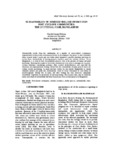Sustainability of assisted shelter projects in post-cyclone communities: The Southkhali case, Bangladesh

View/Open
Date
2009Publisher
BRAC UniversityAuthor
Hakim, Sheikh SerajulMetadata
Show full item recordAbstract
Sustainability results from the combination of a number of socio-cultural, economical, organizational, technical and environmental factors in development. Any project is only sustainable when it meets today’s needs and also thinks about tomorrow’s possible problems and ways to resolve those. Sustainability of housing projects, therefore, must also consider all these. Yet in Bangladesh, it is usual to have un-sustainable projects even in the presence of norms and prior knowledge. Shocking but a matter of fact is that situations are even worse in emergencies (e.g. post-cyclone situation); considering assistance (thus assisted shelters/houses), and especially the intensions and implementation strategy behind that, the sustainability of many projects hence are seldom beyond questioning. As many previous studies (in and outside Bangladesh) in similar situations predict and point out, sustainability could be really overlooked in such forms of (re)development. Having this in mind, and after visiting one such distressed community (Southkhali, Bagerhat), the predictions do not seem wrong. This research, thus, aims to verify the nature and extent of sustainability that truly characterizes these assisted projects in Bangladesh.
